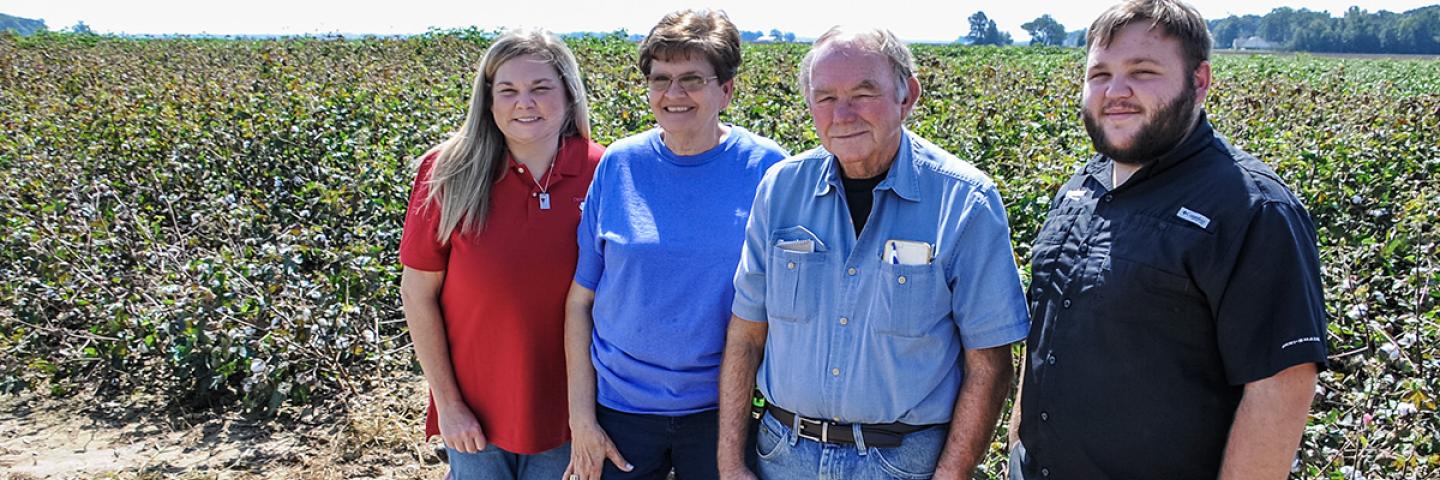Army Veteran Keeps a Tight Knit Unit with more "Boots on the Ground at the Family Cotton Farm in Desha County

By Reginald Jackson
State Public Affairs Specialist
As our nation celebrated the bicentennial in 1976, James Dunnahoe, an Arkansas Army National Guardsman from 1964 until 1970, decided it was time to re-enlist in the Guard. During that same time, he decided to purchase a tractor from his mother and began a small farm of his own in Desha County. He had grown up working on his father’s farm picking cotton and milking cows, so it was a natural progression for him. A few years later in 1978, his then 10-year-old daughter, Sondra, joined him. She’s been working with her dad on the farm ever since.
“Sondra would work in the field and help drive tractors along beside me, so it’s been a family affair for quite a long time,” James said. “She used to hate the weatherman because she knew if the forecast said it was going to rain, we were going to work all night,” he said with a laugh.
James, along with his wife Shirley, Sondra and Sondra’s son Bradley, grow cotton, soybeans and corn on Dunnahoe Farms in Desha County. Bradley hopes to continue the family farming business after he completes his studies in Agribusiness at the University of Arkansas at Monticello.
James, who retired from the U.S. Department of Agriculture in Stuttgart, also retired from the 153rd Infantry Regiment of the Arkansas Army National Guard in 2005 at the rank of first sergeant.
“I didn’t have a direction in life until I got in the military,” he said. “And farming was a necessity, because this is what I knew about growing up.”
“The one thing in life that made him who he is today, is his time in the military,” said Shirley, who manages the family farm, and is a member of the county conservation district board. “He would not change that at all.”
Some of the responsibilities of a first sergeant are to hold formations, instruct platoon sergeants, advise commanders, and assist in the training of all enlisted members.
“He runs this farm kind of like that to,” she said with a chuckle. “If he says it, that’s the way it is, no question about it.”
His family always took care of the farming operation whenever he had to serve on duty.
“He was never worried about being deployed, but we were,” said Shirley. “Someone has to step up and defend the country. Every generation has to realize that. It’s a sense of duty and love of the country.”
The Dunnahoes have long used technical assistance from the USDA’s Natural Resources Conservation Service (NRCS). They’ve installed conservation practices for many years working with former Desha County District Conservationist Gwen Hancock and Soil Conservationist Jennifer Griffin.
“The Dunnahoes are great stewards of the land and are dedicated to protecting and improving all the resources on their farm,” said Griffin, “They currently participate in the Environmental Quality Incentives Program (EQIP) and the Conservation Stewardship Program (CSP).”
CSP offers an opportunity for cotton, soybean and corn producers, and others, to enhance their operations while adopting conservation activities that can reduce energy use, improve soil health, and improve water quality. There are a number of enhancements for crop production. Examples of enhancement options James uses include drift reducing nozzles, GPS targeted spray application, nitrification inhibitors, controlled traffic system and split nitrogen applications to improve soil health and productivity and enhance water quality. They are also using water management activities to improve water efficiency.
“We stay involved with NRCS because of the assistance we receive to enhance our operation,” Shirley said. “We’ve been doing this so long that we just feel that we need to do better for the environment every year. Through the conservation practices we participate in, we see where we are producing more crops every year.”
“You commit yourselves to the conservation programs,” James said. “You don’t want run-off from the fields going on to your neighbors’ farms and into the watersheds. And that makes it better for the environment. My grandson also cares about wildlife and the environment so working with me, he is making a commitment to conservation as well.”
Preparedness and defense are critical to food and agriculture sectors and to sustaining and growing rural Arkansas. That’s why the USDA is looking to military veterans across the country to fill the roles that keep America’s food supply safe and secure, preserve and strengthen rural communities, and restore and conserve the environment.
USDA wants to ensure that veterans looking to return home or start a new career on a farm or in a rural community have the tools and opportunities they need to succeed. USDA’s veterans website serves as a one-stop navigator for veterans looking to learn more about employment, education, and entrepreneurship on or beyond the farm https://www.usda.gov/our-agency/initiatives/veterans.
To learn more about EQIP and CSP opportunities, producers should contact their local USDA service center or go to www.ar.nrcs.usda.gov.

Shirley and James Dunnahoe talk conservation stewardship with Soil Conservationist Jennifer Griffin.
 James Dunnahoe shows equipment to Soil Conservationist Jennifer Griffin. The Dunnahoes participate in EQIP and CSP on their Desha County farm.
James Dunnahoe shows equipment to Soil Conservationist Jennifer Griffin. The Dunnahoes participate in EQIP and CSP on their Desha County farm.

